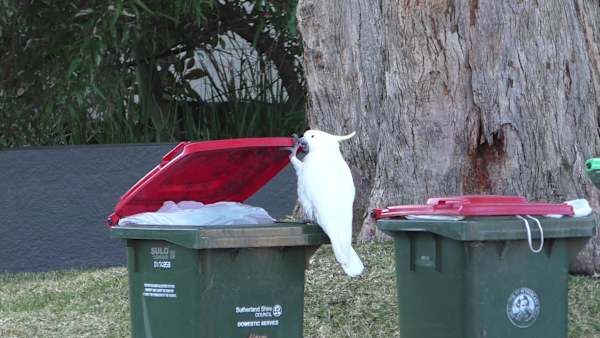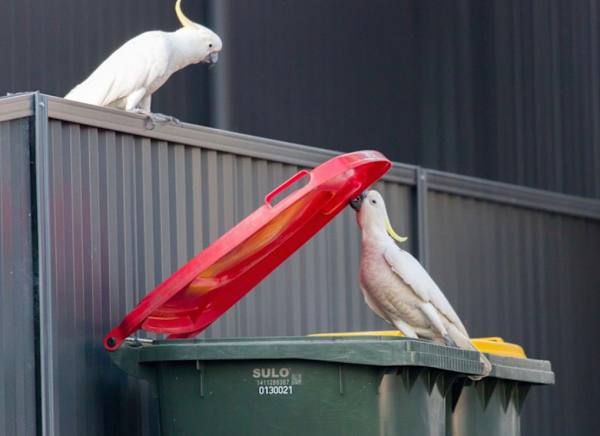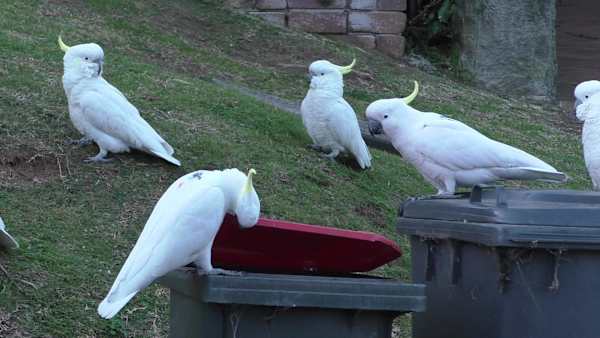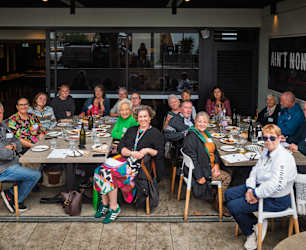More than a decade after Stanwell Park cockatoos were exposed as bin raiders – using their beaks, claws and teamwork to lift lids and rip into refuse – Wollongong City Council has a plan to stop the heists.
'Bin springs' are proposed for residents in "select areas", however, for Neighbourhood Forum 1 (NF1) members, the solution is too little, too late.
"Ten years of trials into red bin locks – and council now releases springs," said NF1 convenor Warwick Erwin, the Helensburgh small business owner who has led the 2508 postcode's community group for almost a decade.
"The initial trials were in 2015 with a group of residents at Hillcrest Retirement Village and were found to be unacceptable, as the tension to keep the bin lid closed from cockatoos was too much for the residents to fully open the bin to place rubbish in."
Warwick said one resident's response summed up the problem: “You had to hold the bin open with one hand and empty your internal bin into it with the other. That was too much for me."
Cockatoos started by targeting general waste bins with red lids but have acquired a taste for Food Organics and Garden Organics (FOGO).
"Now residents are reporting cockatoos attacking green bins with FOGO bags at the top," Warwick said.
On learning that 'bin springs' were the proposed solution, he had more questions: "Will Council now install bin locks on all bins in the local government area? Will Council now reimburse residents for the bin locks they have had to install due to Council’s failure to prevent the mess from bin attacks or even clean up the mess?
"Many residents have had to purchase commercial bin locks and fit or have them fitted to try and stop the mess created by the bin attacks."

A short history of avian adaptation
Sydney has the ibis, Wollongong’s northern suburbs have the cockatoo and The Illawarra Flame has reported on our unique ‘bin chickens’ many times over the past decade, starting in 2014 when local ornithologist Dr Richard Major, a senior fellow at the Australian Museum, told us the cockatoos' behaviour was highly unusual.
“When I tell my colleagues about cockatoos getting into bins, we just don’t know of it elsewhere,” he told us at the time. “Probably a couple of cockatoos have worked it out and they have transferred that knowledge onto others in the local area. They are smart birds and they are also very co-operative birds, they are gregarious birds.”
Much has changed in the past decade, with the birds, at least, becoming smarter.
In 2021, after a cockatoo study was published in the journal Science, Dr Major wrote an article, saying: “What started out just south of Sydney spread quickly – within two years, bin-flipping had gone viral across 44 geographically linked suburbs.
“Sulphur-crested cockatoos are copy-cats and after one individual solves the lid-flip puzzle, other birds in its social network imitate the new foraging innovation."
Last month, scientists revealed some cockatoos have figured out how to work bubblers, using their claws and beaks to twist handles designed for human use and sip from public drinking fountains. The research was published in a June paper in The Royal Society Biology Letters titled "Emergence of a novel drinking innovation in an urban population of sulphur-crested cockatoos, Cacatua galerita".

A decade of bin testing
Through all these years of avian innovation, local residents have continued to sweep up their footpaths and campaign for bin locks.
In response to complaints in October 2015, a council spokesperson told us: “Wollongong City Council is continuing to work with REMONDIS Harbour Cities on a trial of bin locks in the Stanwell Park area where a number of bins have been fitted with the Envirolock. The trial is ongoing and no decision has been made yet.’’
In May 2025, The Illawarra Flame requested another update and a spokesperson said: “Council has previously approved trials of different types of bin locks to address birdlife accessing kerbside bins with varying success.
"Council’s waste service provider has more recently trialled the use of bin springs to address this issue. These bin springs can be issued and fitted to kerbside bins in select areas where a persistent issue has been identified and assessed.
"We encourage residents having problems with birds scavenging through domestic waste bins to contact Remondis on 1300 362 360 to discuss the specific problem so the best solution can be implemented.”

Do you have a cockatoo tale or a bin fix? Please get in touch






